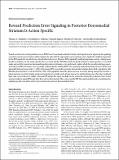Reward Prediction Error Signaling in Posterior Dorsomedial Striatum Is Action Specific
Author(s)
Ogawa, Masaaki; Stalnaker, Thomas A.; Calhoon, Gwendolyn G.; Roesch, Matthew R.; Schoenbaum, Geoffrey
DownloadStalnaker-2012-Reward prediction er.pdf (2.459Mb)
PUBLISHER_POLICY
Publisher Policy
Article is made available in accordance with the publisher's policy and may be subject to US copyright law. Please refer to the publisher's site for terms of use.
Terms of use
Metadata
Show full item recordAbstract
Neural correlates of reward prediction errors (RPEs) have been found in dorsal striatum. Such signals may be important for updating associative action representations within striatum. In order that the appropriate representations can be updated, it might be important for the RPE signal to be specific for the action that led to that error. However, RPEs signaled by midbrain dopamine neurons, which project heavily to striatum, are not action-specific. Here we tested whether RPE-like activity in dorsal striatum is action-specific; we recorded single-unit activity in posterior dorsomedial and dorsolateral striatum as rats performed a task in which the reward predictions associated with two different actions were repeatedly violated, thereby eliciting RPEs. We separately analyzed fast firing neurons (FFNs) and phasically firing neurons (total n = 1076). Only among FFNs recorded in posterior dorsomedial striatum did we find a population with RPE-like characteristics (19 of all 196 FFNs, 10%). This population showed a phasic increase in activity during unexpected rewards, a phasic decrease in activity during unexpected omission of rewards, and a phasic increase in activity during cues when they predicted high-value reward. However, unlike a classical RPE signal, this signal was linked to the action that elicited the prediction error, in that neurons tended to signal RPEs only after their anti-preferred action. This action-specific RPE-like signal could provide a mechanism for updating specific associative action representations in posterior dorsomedial striatum.
Date issued
2012-07Department
Massachusetts Institute of Technology. Media LaboratoryJournal
Journal of Neuroscience
Publisher
Society for Neuroscience
Citation
Stalnaker, T. A. et al. “Reward Prediction Error Signaling in Posterior Dorsomedial Striatum Is Action Specific.” Journal of Neuroscience 32.30 (2012): 10296–10305. © 2012 by the Society for Neuroscience
Version: Final published version
ISSN
0270-6474
1529-2401